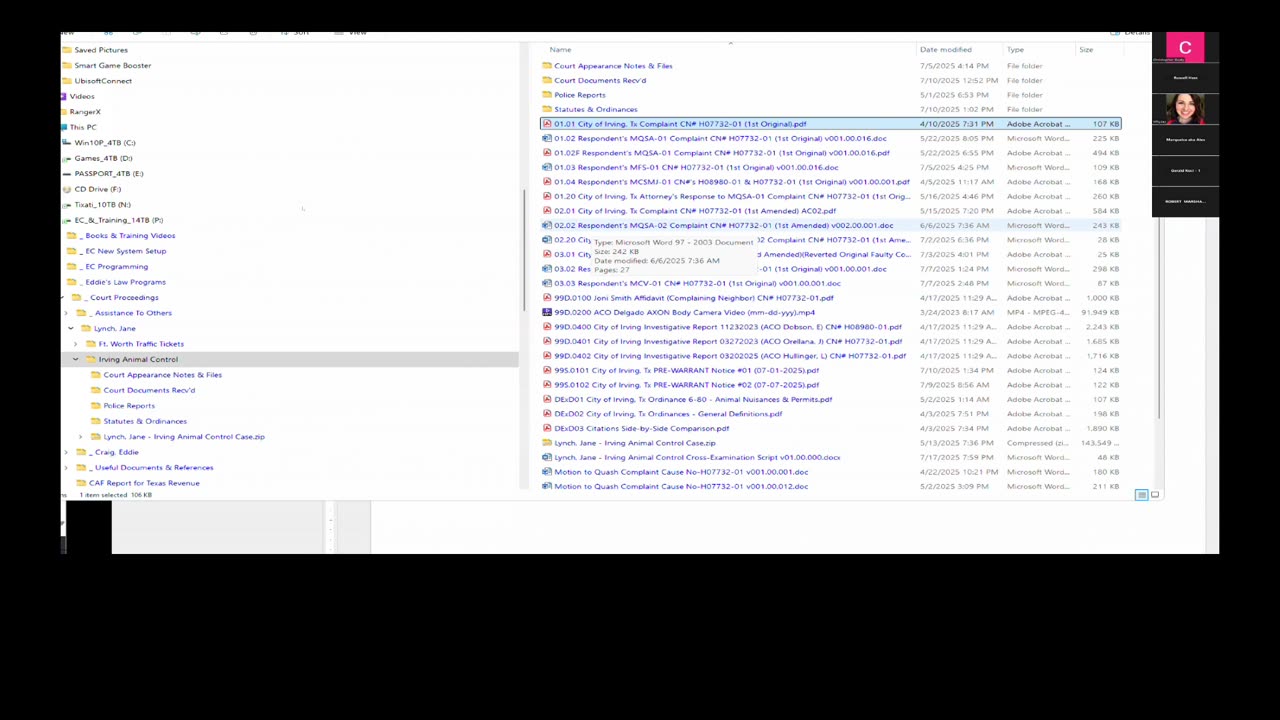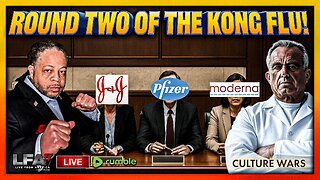Premium Only Content

2025-07-17 Tao of Law Class with Eddie Craig part 2
Make a donation to Eddie (which is always appreciated):
https://www.ruleoflawradio.com/donations.htm
Purchase a class subscription here:
www.logosradionetwork.com or www.ruleoflawradio.com
Texas Codes & Rules Online:
State Statutes: http://www.statutes.legis.state.tx.us/
Admin. Code: http://texreg.sos.state.tx.us/public/readtac$ext.viewtac
Rules of Evidence: https://www.texasevidence.com
Rules of Civil Proc.: https://www.txcourts.gov/media/1446498/trcp-all-updated-with-amendments-effective-may-1-2020.pdf
Tao of Law is inviting you to a scheduled Zoom meeting.
** NOTICE **
ALL Classes for the month of July 2025 are free and open to all.
Meeting ID: 870 6712 0504
Passcode: 868063
Meeting summary
Lecture on legal strategies for breaking down statutes, preparing legal pleadings, and addressing jurisdictional challenges in court cases.
Highlights
1. Breaking Down Ordinances and Statutes
• Eddie Craig explained the process of breaking down ordinances and statutes into their individual elements to understand their legal implications and requirements.
• He demonstrated how to color-code sections of ordinances to organize and identify key elements, such as general sections, specific subsections, and individual sub-items.
• The example of ordinance 6-80 was used to highlight the importance of understanding owner responsibility for animals and the conditions under which public nuisances are created.
• Eddie emphasized the need to identify and challenge vague, ambiguous, or overbroad statutes, as they can lead to unconstitutional applications.
2. Legal Frameworks and Argumentation
• Eddie discussed the importance of creating a structured outline to address legal pleadings, including identifying specific factual points and elements to argue.
• He highlighted the necessity of understanding both sides of an argument to effectively counter opposing perspectives in real-time during legal proceedings.
• The discussion included the importance of critical thinking and analytical skills in legal contexts, particularly for pro se litigants who must fulfill multiple roles, such as research, writing, and courtroom argumentation.
3. Challenges in Pro Se Litigation
• Eddie emphasized the difficulties of being a pro se litigant, including the need to master research, document preparation, and courtroom argumentation.
• He explained the importance of understanding legal definitions and statutory language, as terms often have specific meanings that differ from common usage.
• The group discussed the risks of relying on anecdotal success stories or unsupported legal theories, such as "state national" arguments, which Eddie strongly criticized as being based on misinterpretations of federal statutes.
4. Case Study: Jane’s Animal Control Case
• Eddie provided an overview of Jane’s case involving an animal control ordinance, detailing the legal challenges and motions filed, including motions to quash, set aside, and challenge subject matter jurisdiction.
• He explained the city attorney’s repeated withdrawal and amendment of complaints, which indicated weaknesses in their case and potential malicious prosecution.
• Eddie shared his organizational system for case files, including naming conventions and version control, to maintain clarity and chronological order in legal documentation.
5. Legal Definitions and Ambiguities
• Eddie highlighted the importance of understanding statutory definitions, as terms like "state" and "United States" can have multiple meanings depending on the context.
• He explained how ambiguous or undefined terms in ordinances, such as "location" or "private property," can lead to legal challenges and unconstitutional applications.
• The discussion included examples of compound definitions, where terms within a statute require further clarification through additional definitions.
6. Traffic Stops and Obstruction Charges
• Sam and his brother discussed an obstruction charge stemming from a traffic stop for a defective headlight, which was later dismissed.
• Eddie advised them to review Oklahoma statutes on vehicle equipment and obstruction to determine whether the initial stop was lawful and whether the obstruction charge could stand independently.
• He explained that if the initial stop was illegal, the officer could not have been engaged in lawful duties, making the obstruction charge invalid.
• Eddie recommended filing motions to dismiss based on the invalidity of the stop and conducting research in law libraries to find supporting case law.
7. Subject Matter Jurisdiction Challenges
• Eddie explained that subject matter jurisdiction can be challenged at any time, even after a trial, if it can be proven that the court lacked jurisdiction due to an invalid offense.
• He clarified the distinction between subject matter jurisdiction and personal jurisdiction, emphasizing the importance of reserving the right to challenge personal jurisdiction during initial court appearances.
8. Licensing and Regulated Activities
• Eddie discussed the concept of licensing and regulated activities, using examples like fishing licenses and transportation laws to illustrate how legal capacities are assumed voluntarily.
• He explained the difference between public resources, such as roads and oceans, and private resources, emphasizing the right to use public roads without a license unless engaged in regulated activities like transportation for hire.
• The group explored the implications of accepting legal capacities, such as obtaining a driver’s license, and how they relate to jurisdiction and legal responsibilities.
9. Preparing for Trial and Cross-Examination
• Eddie advised Sam to prepare for trial by understanding the elements of the obstruction charge and practicing cross-examination to handle courtroom pressure effectively.
• He emphasized the importance of knowing the statute and its elements to challenge the validity of the charge and the officer’s actions during the traffic stop.
• Eddie recommended using trial as an opportunity to introduce arguments about the invalidity of the stop and the lack of lawful duties being obstructed.
10. Class Resources and Assignments
• Eddie provided attendees with resources, including a zip file containing case documents, ordinance PDFs, and a Word document on breaking down ordinances.
• He assigned homework to read and analyze the provided documents, understand arguments from both sides, and prepare questions for the next class.
• Eddie encouraged attendees to document their questions thoroughly, including references to specific pages and paragraphs, to facilitate efficient discussion in future sessions.
Next steps
1. Download the three PDFs (City of Irving ordinance, definition section from ordinance, and Chapter 9 on local government code) from the chat and place them in the same folder as the zip file containing Jane's case documents: All participants.
2. Download the zip file named "Jane-Irving Animal Control" from the public folder link provided in the chat and unzip it to access the documents: All participants.
3. Read the documents in the zip file in the order they are presented to understand the arguments made by both sides: All participants.
4. Review the three PDFs referenced by the city attorney to understand the basis for her actions and compare them with Eddie Craig's pleadings: All participants.
5. Prepare questions based on the reading of the documents and note down the page and paragraph where the question originated for discussion in the next class: All participants.
6. Research the Oklahoma statute on headlamps to determine whether it explicitly requires two working headlights and assess its relevance to the obstruction charge: Sam and his brother.
7. Investigate case law related to the Oklahoma headlamp statute and "mistake of law" using resources like a law library or Lexus Nexus to find supporting or opposing precedents: Sam and his brother.
-
 LIVE
LIVE
The Drew Allen Show on DailyClout
2 hours ago"Trump DOJ Turns Democrats Into Gun Lovers"
42 watching -
 1:00:39
1:00:39
The Rubin Report
2 hours agoIt’s Official: Border Czar Names the Four Blue Cities Trump Will Target Next
21.2K14 -
 1:13:22
1:13:22
The Mel K Show
2 hours agoMORNINGS WITH MEL K - Clown Show in DC RFK Jr. Hearing Prove We the People are the Only Answer 9-5-25
5.26K5 -
 LIVE
LIVE
Film Threat
18 hours agoTHE CONJURING: LAST RITES + SPLITSVILLE + TONS OF REVIEWS! | Film Threat Livecast
100 watching -
 59:45
59:45
VINCE
4 hours agoRFKage Match! Kennedy Destroys Corrupt Senators In Wild Hearing | Episode 119 - 09/05/25
154K150 -
 LIVE
LIVE
LFA TV
6 hours agoLFA TV ALL DAY STREAM - FRIDAY 9/5/25
2,486 watching -
 2:18:21
2:18:21
Benny Johnson
3 hours agoBiden Appears With MASSIVE Scar on Face, New Health Horror Revealed! Sobbing Jimmy Kimmel FLEEING US
41K34 -
 1:24:48
1:24:48
The Big Mig™
5 hours agoBig Pharma's Puppets: RFK Jr. Takes on Congress
19.2K7 -
 LIVE
LIVE
Total Horse Channel
13 hours ago2025 Reno Snaffle Bit Futurity | Friday
23 watching -
 26:40
26:40
Rethinking the Dollar
3 hours agoPeter Schiff: "Trump's Economy WORSE Than Biden" | Morning Check-In: Let's Talk...
12.4K21